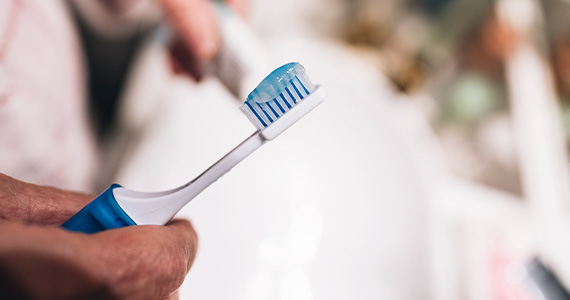Toothbrushes, Toothpaste & Floss: A Variety of Choices
Tips to help you choose what oral care products to use

Toothbrushes
- Bristles are a very important feature of a good toothbrush. Choose a toothbrush with soft, round-tipped nylon bristles. Stiff or sharp bristles can injure your teeth and gums. Teeth are covered by a layer of enamel that can be worn down by scrubbing too vigorously with a hard-bristle brush.
- Choose a size and shape that is comfortable and lets you reach the surfaces of every tooth. A small, compact head works best.
- Replace your toothbrush when the bristles bend or look worn—about every three to four months. Replace your toothbrush after an illness. Children's brushes may have to be replaced more often.
- If you have small children, let them pick out their own toothbrush. This helps to engage them in taking care of their oral health.
Traditional or electric toothbrushes can be equally effective. People with braces, a disability, arthritis or arm and shoulder problems might prefer an electric toothbrush for convenience as well as comfort. When purchasing an electric toothbrush, be sure the head is not too big for your mouth and the bristles are soft.
Toothpaste
- Choose a toothpaste that contains fluoride. Fluoride helps restore the minerals in weakened enamel.
- Other factors in choosing a toothpaste are personal preferences, such as flavor, tartar control and whitening properties.
- If you have small children, try some fun flavors to help encourage their brushing.
Dental floss
The right floss helps to remove plaque and food particles from between your teeth and along the gum line. Choosing the right floss to fit your needs is important in maintaining your oral health.
Traditional dental floss is made of nylon and is available in different thicknesses and flavors. It may be waxed or unwaxed. Monofilament floss is made from material such as Teflon, which makes it resistant to shredding. Dental tape, also known as ribbon floss, is thicker and flatter than traditional floss. Expanding floss expands on contact with saliva and conforms to the contours of teeth.
Other interdental cleaners
While dental floss is highly effective, other types of interdental cleaning devices exist. They may be helpful as part of your daily routine under certain circumstances.
- Water flossers/oral irrigators - These devices can reach areas that are difficult with regular floss. You may find them helpful if you have braces, bridges or dental implants.
- Interdental brushes - These small brushes may be helpful for cleaning between the teeth if you have larger gaps, braces or bridges. If you have difficulty with regular floss, they may be easier to use.
- Floss picks - Floss picks have a thin strand of floss stretched across plastic. Some people find them easier to use than traditional floss. However, they may not be as effective as traditional floss. This is because the strand of floss can become worn or frayed. In addition, the handle/holder may not allow you to contour the floss to your teeth effectively.
A daily combination of toothbrushing with a fluoride toothpaste and flossing to clean between your teeth can prevent gum disease, tooth decay and bad breath. There are many choices when it comes to what dental products you might use. Choosing the right products for your needs is dependent on factors such as your personal preference, tooth spacing and the type of dental work you have. Talk with your dentist or dental hygienist to learn what their recommendations might be. When shopping, it may also be helpful to look for the American Dental Association (ADA) seal of acceptance. Companies that use the seal dedicate significant resources to test and market products. The seal tells you the product is safe, effective and meets ADA requirements.
Save with Blue365®
BCBS FEP Dental members can access premier health and wellness discounts from leading brands through our Blue365 program. Many deals are available and new ones are constantly being added. Available items include discounts on teeth whitening kits, strips and toothpaste, a smoking cessation program and personal care products like electric toothbrushes. Visit Blue365 to learn more.
Note: The information in this article is not meant to replace the advice of your dentist or another licensed healthcare professional. Talk to your dentist for any specific dental advice.
Source: https://www.ada.org/resources/research/science-and-research-institute/ada-seal-of-acceptance






